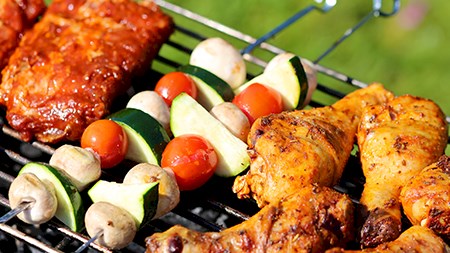Learn how you can become a natural born griller with these scorching braai tips.
With the fire and tongs being such an important part of our national culture, and braai time being a year-round activity, it’s never amiss to have a few extra tips and tricks up your sleeve. Here are some that should guarantee a few masterpieces this summer.
When cooking meat on a braai, always start with meat at room temperature, seal the meat quickly on all sides at a high temperature and then let it rest for 5 – 10 minutes before braaing it over a slightly lower heat. This ensures the moisture is trapped inside the meat and adds to tenderness and flavour.
Push all the coals into one spot to create that one hot spot for sealing, and then while the meat is resting redistribute the coals and allow them to cool a bit.
Nothing beats a wood fire. Use charcoal as a base so that when your flames have died down the charcoal is ready for braaing. Throw in some bay branches for an extra lovely flavour.
When cooking lamb, cover the grid with fresh rosemary sticks and slices of lemon, add a layer of meat, seasoned to taste, and then cover with another layer of rosemary and lemon. Braai until cooked.
Avoid turning meat too many times and always allow to rest before eating for added succulence.
For tender ribs, par-boil first in water with bay leaves and peppercorns. Then drain and allow to rest in marinade before braaing.
For succulent chicken par-cook in marinade and then brown on the braai.
Dip wors in water shortly before cooking it. This makes the skin more elastic and prevents it from bursting open during the braai – losing its juices and drying out.
Skewer lamb chops and pork rashers and stand fat side down first when braaing to crisp the fat. Once crispy remove the skewer and braai as usual.
When using garlic in a marinade, smash whole cloves, and pop them in the oven for a while to warm them up before adding them to the marinade - this releases the flavour wonderfully.
Use robust herbs like rosemary and lemon thyme in marinades as the more fragrant herbs like basil, dill and coriander discolour and lose their flavour quickly – rather add these just before, during or after cooking.
Use pawpaw pips in a dry rub to help tenderise the meat. Dry smash, or blitz the pips in a grinder then add them to the dry rub, and leave for 2 days. Wash the rub off and add fresh rub (this time without the pawpaw pips) a few hours before cooking.
Don’t marinade fish or chicken in lemon juice – it begins “cooking” the fish or chicken as soon as it touches it, leaving it leathery and dry. Rather squeeze it on fresh after you’ve cook it.



